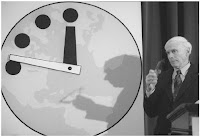... but I'm finally standin' upright on the ground.
And after takin' sev'ral readings,
I'm surprised to find my mind's still fairly sound..."
- Willie Nelson, Me and Paul
Willie doesn't need a U of Chicago economics diploma hanging on the wall in his tour bus. He just knows good sense and how to not take things too seriously. I'm going to borrow his words above to explain what is essentially a very simple economics concept. Stay tuned.
As I bemoaned in a recent blog, talking heads everywhere are proclaiming the death of the free market, but NOT the death of capitalism and NOT a turn toward socialism (that would be politically unwise to say). In saying this crap, they show their lack of understanding of economics. A free market is a necessary prerequisite of the capitalism model because this is how prices are determined ... and prices are the uniform measure which ensures capital is allocated most efficiently ... and efficient capital allocation ensures that the most "value" is wrung from every bit of capital. This is capitalism' single goal.
- It's goal is NOT fairness (Thomas Friedman said it himself on Meet the Press this week: "Fairness is not on the table anymore ... we either have systemic risk or find a way out of this mess.")
- It's goal is NOT equality (actually, perfect equality and perfect capitalism are completely incompatible, as forced equality kills the incentive mechanism)
- It's goal is NOT stability (and that's where Willie's words come in. Free-market capitalism is great at achieving its goal, but it does not guarantee a smooth or direct path. This is not a failing of the model, it is a result of the imperfection of the human mind in making decisions)
Capitalism focuses on what it's good at (the economy) and leaves social topics to social constructs. Advocates of other models such as socialism and communism may be reluctant to admit as much, but the ultimate goal of these models, in pure form, is the same.
The only real difference between the models is simply who makes the decisions.
Socialism presumes that government officials are in the best position to make decisions for the common people, and that their goal must be equality. Our economy is so bogglingly complex that, for this model to work, government must be comprised of a cadre of elite, selflessly compassionate intelligentsia with perfect foresight and super-human decision-making abilities.
 Until a doting, grandfatherly HAL 9000 emerges (and it's already 7 years late!), free-market capitalists believe that it takes the entire population of the economy to get decisions right. Leveraging 4 billion years of evolution (or 6 days of creation, which ever you prefer), capitalism makes use of each person's instinctive desire to maximize pleasure while minimizing pain. Each person is empowered to constantly make the decisions that are best for themselves based on the information at hand.
Until a doting, grandfatherly HAL 9000 emerges (and it's already 7 years late!), free-market capitalists believe that it takes the entire population of the economy to get decisions right. Leveraging 4 billion years of evolution (or 6 days of creation, which ever you prefer), capitalism makes use of each person's instinctive desire to maximize pleasure while minimizing pain. Each person is empowered to constantly make the decisions that are best for themselves based on the information at hand.
Each owner of capital (including the human capital of our own labor and intelligence) is empowered to constantly make decisions about the best use of that capital in order to maximize the NPV of future profits from it. This NPV is represented by the current price of the capital. If the owner "prices" his capital at $1,000, but a smart  entrepreneur thinks of a better use and "prices" it at $1,200, then the owner should be ecstatic to sell it to the entrepreneur at any price above $1,000. Done a trillion times a day, such interaction maximizes the overall output and value of the entire economy. In short, decision-making is decentralized to the lowest possible level, not hoarded in Washington.
entrepreneur thinks of a better use and "prices" it at $1,200, then the owner should be ecstatic to sell it to the entrepreneur at any price above $1,000. Done a trillion times a day, such interaction maximizes the overall output and value of the entire economy. In short, decision-making is decentralized to the lowest possible level, not hoarded in Washington.
Progressive Lefties will immediately smell a rat here. This process does nothing to ensure that all the pie slices are equal. They're right. Capitalism simply grows the entire pie, and in doing so makes EVERY slice bigger. Bill Gates' decisions vastly grew his slice of the pie, both in absolute terms and in relation to everyone
else's. He
benefited unequally from his own success. That's the incentive mechanism of the economic model.
As a side-effect, the whole pie got bigger, and that has benefited even the poorest among us (see my recent blog on poverty for more on this) but social concepts like equality, fairness, stability, or poverty eradication should be handled via social constructs. Asking an economic model to address social goals creates an unnatural and unstable conflict of interest. To impose these goals on capitalism would require convincing every member of the economy to make decisions which do not maximize their own well-being. On the other hand, the concentration of power required by socialism, creates an much more practical way of imposing these goals on a populace without their consent.
Is that really what we want? If not, we need to put our politicians back in line.







 Additional Reading:
Additional Reading:

